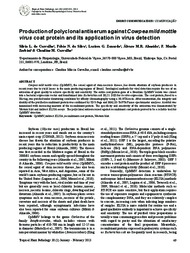Production of polyclonal antiserum against Cowpea mild mottle virus coat protein and its application in virus detection.
Production of polyclonal antiserum against Cowpea mild mottle virus coat protein and its application in virus detection.
Autoria: CARVALHO, S. L. de; SILVA, F. N. da; ZANARDO, L. G.; ALMEIDA, A. M. R.; ZERBINI, F. M.; CARVALHO, C. M.
Resumo: Cowpea mild mottle virus (CpMMV), the causal agent of stem necrosis disease, has drawn attention of soybean producers in recent years due to yield losses in the main producing regions of Brazil. Serological methods for viral detection require the use of an antiserum of good quality to achieve specificity and sensitivity. The entire coat protein gene of a Brazilian CpMMV isolate was cloned into a bacterial expression vector and transformed into Escherichia coli BL21::DE3 for in vitro expression. The coat protein, fused to a His-tag, was purified under denaturing conditions by affinity chromatography using a Ni-NTA resin. After renaturation, the integrity and identity of the purified recombinant protein was confirmed by SDS-Page and MALDI-ToF/ToF mass spectrometer analyses. A rabbit was immunized with increasing amounts of the recombinant protein. The specificity and sensitivity of the antiserum was demonstrated by Western blot and indirect ELISA assays. The polyclonal antisera raised against recombinant coat protein proved to be a reliable tool for CpMMV detection.
Ano de publicação: 2013
Tipo de publicação: Artigo de periódico
Unidade: Embrapa Soja
Palavras-chave: Cowpea mild mottle virus, Doença de planta, Plant diseases and disorders, Soja, Soybeans, Vírus
Observações
1 - Por padrão são exibidas publicações dos últimos 20 anos. Para encontrar publicações mais antigas, configure o filtro ano de publicação, colocando o ano a partir do qual você deseja encontrar publicações. O filtro está na coluna da esquerda na busca acima.
2 - Para ler algumas publicações da Embrapa (apenas as que estão em formato ePub), é necessário ter, no celular ou computador, um desses softwares gratuitos. Sistemas Android: Google Play Livros; IOS: iBooks; Windows e Linux: software Calibre.
Acesse outras publicações
Acesse a Base de Dados da Pesquisa Agropecuária (BDPA) para consultar o acervo completo das bibliotecas da Embrapa.

